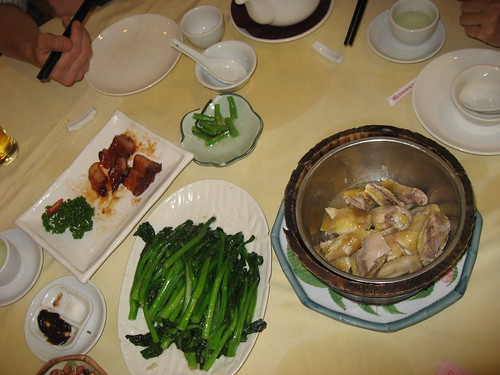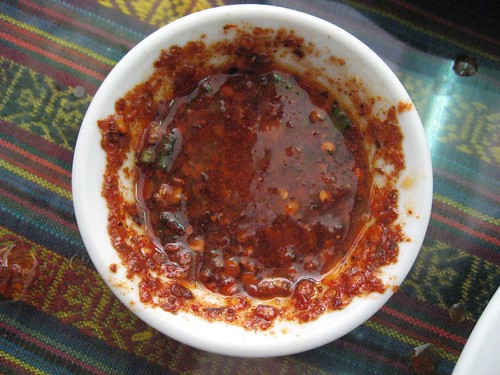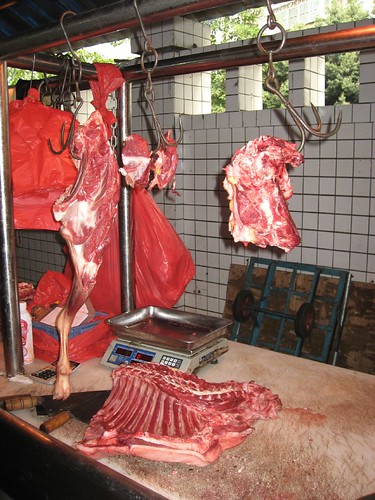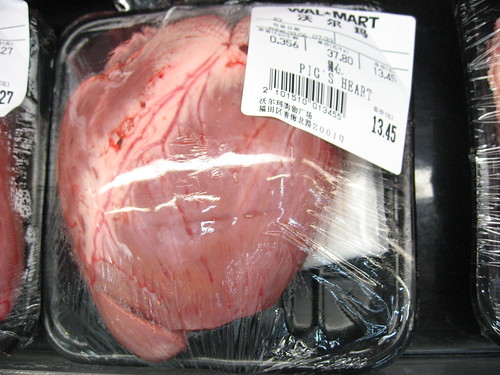
Manners
Manners certainly differ across countries, but by American standards, some Chinese manners are, um, severely lacking.
For example, everyone screams fu yuan! (“waiter”) to get attention in a restaurant.
For any food with bones, you put the entire piece, bone and all, into your mouth, then simply spit the bone back out onto the table afterward.
Used napkins get thrown to the floor. One ashes cigarettes on the floor.
And one should continuously spit on the floor during the meal–either simple saliva, or else one of the many foods the Chinese like to eat, simply to spit more: watermelon, sunflower seeds, and peanuts.
At multiple meals, I have seen men take off their shirts (perhaps a good reason for private rooms?).
However, don't be fooled. They still have rules of etiquette. I got reprimanded for using a cloth napkin to–shocking!–wipe my face.
Paper napkins are for wiping (then throwing down on the floor, amidst the spit and seeds).
Different strokes for different folks.
In China, communal Lazy Susans and dishes are universal.
This is great for sampling, but unspoken yet complex rules govern when one can spin the Lazy Susan to get that one dish one wants to eat.
I hope to learn this convention soon because Murphy's Law dictates that fish heads usually lie closer to me, while tasty, bone-free tofu always sits just out of reach.
I could stand up to get it, reaching over everyone, since that's not considered rude, but spinning the Lazy Susan seems to be forbidden. Fascinating.

Regional Delicacies
Sichuan region is best known for spice and hot pots.
Most local spice is bearable, but one, the “numbing spice” (ma la), seriously tingles, then numbs your mouth, lips, and ultimately trachea.
After my leg fell asleep, I learned that our sensation called “pins and needles” is the same word as this spice.
Great, Sichuan. Your spice makes your body feel asleep and tingly. No one wants that.
Hot pot also provides a unique experience, certainly worth a try in Sichuan.
This dish involves cooking all your ingredients in boiling oil at your table.
These pots are usually ridiculously spicy– all of the ones I have tried have had oil that looked like boiling blood– yum.
What one dips in the hot pot is usually mystery meat, so it is best to leave the dictionary at home. What I first thought were tofu-like noodles turned out to be duck intestines.
They were more palatable as tofu-noodles! Most interesting perhaps was their hot dogs, cut so that they bloomed in the oil.
Odd– hot dogs that appear to bloom in bloody oil. Delicacies abound!
Actually, though, I now love hot pot– but it did take me a few months to get used to it, a lot of oil stains on my clothes (seriously- almost everything I own), and the discovery of the “yin yang” hot pot– the half spice, half soup variety.
No wonder the Chinese ask me so regularly if I've “acclimated”– they knew I'd come around to this tasty treat.
See also: Basic Tips for First Time Travelers in China

Markets and Cooking
Living and cooking with a Chinese roommate exposes one to several interesting dishes not on a restaurant menu.
For example, the copious hot dog aisle in the supermarket (yes, it's an entire aisle), produced one stupendously inedible dish involving pickled eggs and hot dogs.
Now, I hate nothing more than pickling, but I also am queasy about eggs, so perhaps I am the wrong person to judge, but these eggs were the worst things I've ever tasted, and not made better by the hot dogs, which smelled like cat food.
While I find almost all Sichuan food delicious, this one is beyond me even its texture is appalling since pickled eggs are preserved in sand of sorts. Scrumptious.
This dish also includes MSG, of course–everything we cook does.
My roommate (who is Chinese and thus controls all essential purchases for our kitchen) needs the all-white spice set: salt, sugar, and MSG. Flavor be damned!

The meat market has also proved to be a real adventure.
Many sights there are daunting: entire pig heads, bloody puddles, baskets of lungs (don't bump them!), and piles of pig feet.
I also have seen women throw their money onto raw meat while paying, which is gross for the cash, grosser for the meat, and grossest when someone with bloody hands picks up the money.
This lack of sanitation tries my Western phobia of raw meat, but some things are particularly shocking, especially the meat grinding.
To get your meat cut, you put it into filthy plastic baskets, then put it through a grinder, which is slathered in meat from previous grindings and appears never to have been washed: no gloves, no refrigeration, no problem.
Oh, when you purchase meat at the market, it usually sits afterward on desks at the office for hours before one goes home to cook it for lunch.
My neighbor likes to leave an entire, dead duck on her desk. Maybe it helps you build up an appetite.
Despite my distrust of the hygiene in the meat market and my distaste for pickled eggs, most cooking experiences here are delightful, and I love trying new vegetables, many entirely new for me.
Also fascinating is what one cannot get in China.
For example, milk is only sold in small juice-box size, never larger.
Prepared chicken broth simply cannot be bought in China.
However, other things are readily available: cilantro (which my roommate cautions is terrible for men's' health) or winter melon (gigantic–tastes like a potato but with melon texture) and other unfamiliar produce.

Final Course
Eating in China will never be boring.
Delicious food will be coupled with hilarious observations and lavish hospitality, maybe involving unwanted pig hooves.
You can't separate the food from the accompanying hospitality rituals and the distinctive local manners.
And you can never distance yourself from eating– it's the heart of the day.
Just be advised, the food is oily, and chopsticks don't help.
If I've learned any one thing, it's to bring along a Tide pen– you will get oil on every piece of clothing you own.
That is a Sichuan certainty. There are no ifs, ands, or buts about that one.
______
Photo Credit: All photos courtesy of David Lee.
Laura is currently working at a microfinance bank in rural Sichuan, China. She'll be traveling around China this spring and then sailing on Semester at Sea around the Mediterranean this summer. Not surprisingly, she studied international relations in college, graduating from Wesleyan University in 2008. As a self-proclaimed “Cheapion,” or champion of cheap, all of these travels will be done on a tight budget.
Planning a trip? Go Backpacking recommends:
- G Adventures for small group tours.
- Hostelworld for booking hostels.

Large Pot
Tuesday 2nd of November 2010
Oh!...that's great helpful, it's so right to me! Million thanks for the article,
what is leukemia
Friday 29th of October 2010
Thank you for give very nice knowledges. Your website is goodI am impressed by the information that you have on this blog. It shows how well you understand this subject. Bookmarked this page, will come back for more. You, my friend, ROCK! I found just the information I already searched everywhere and just couldn't find. What a perfect site. Like this website your website is one of my new favs.I like this website given and it has given me some sort of desire to have success for some reason, so keep up the good work
Tony Maine
Friday 29th of October 2010
Of course, what a great site and informative posts, I will add backlink - bookmark this site? Regards, Reader.
Suzy Lounge Bar
Sunday 12th of September 2010
Great article! I didn't know that Chinese people spit on the floor during meal, that's a big no no! = )
Dee
Tuesday 19th of January 2010
Ha ha, I thought this would be an article about food safety regulations, but the sensations you described were certainly bad enough!